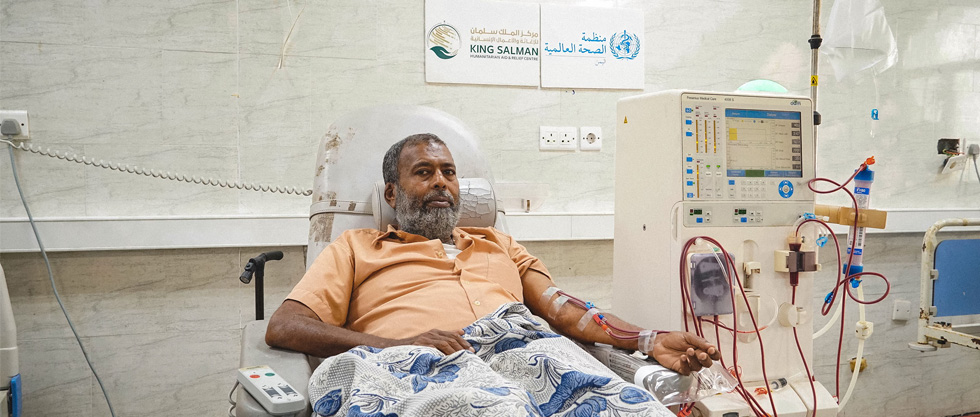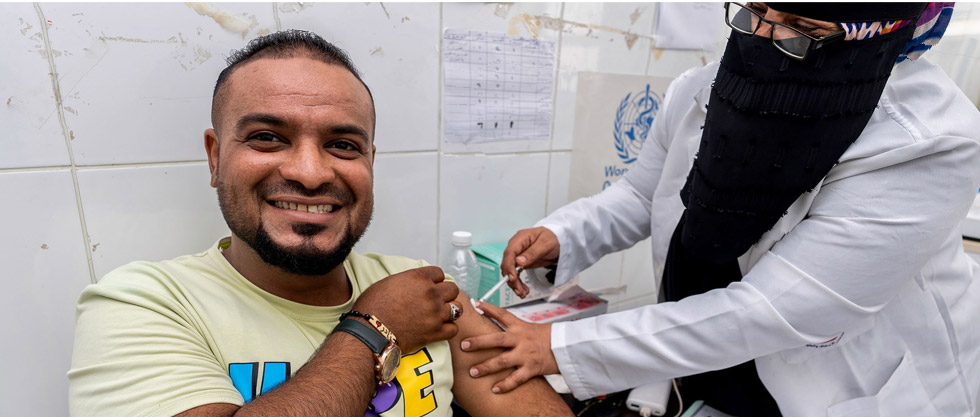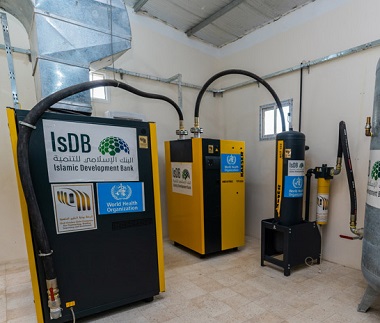Strengthening pre-hospital trauma and emergency care services in Aden, Yemen

7 November 2022 – Against the backdrop of Yemen’s long-running civil conflict and deepening humanitarian crisis, WHO is working with the Ministry of Public Health and Population and EU Humanitarian Aid to sustain and strengthen the country’s only life-saving pre-hospital trauma and emergency care services in the metropolitan area of Aden governorate.
For the fifth consecutive year, Yemen is recording the highest country caseload of conflict-related trauma in the WHO Eastern Mediterranean Region. Injuries account for 60% of deaths among children ages 5–14, as well as 36% of deaths among persons from 15 to 64 years of age, yet the country has no formalized pre-hospital services, apart from those supported by EU Humanitarian Aid and provided by WHO in partnership with the Ministry of Public Health and Population in Aden governorate.
WHO, with EU Humanitarian Aid's support, is working closely with the Ministry of Public Health and Population to sustain and strengthen the life-saving pre-hospital referral system through provision of 11 ambulances, 33 trained paramedics and drivers, 14 operating staff and a dedicated 24/7 dispatch centre for the 195 emergency telephone number. The partnership is also keeping services running by providing operational support for fuel, medical equipment and capacity-building to improve the quality of health care.
Saving lives with dialysis in Yemen

25 October 2022 – Thousands of Yemenis with kidney disease require dialysis treatments to keep them alive and well. WHO in partnership with KSrelief continues provisioning health facilities with dialysis equipment, supplies and financial support needed to sustain dialysis for about 3,500 patients across the country.
Partnering to fight COVID-19

25 October 2022 – WHO in partnership with USAID has mounted successive COVID-19 vaccination campaigns that have immunized nearly 881,000 people to date in IRG-controlled Southern and Eastern Yemen. But vaccination progress has been continually slowed by misinformed and fear-based community rumors.
Only 10.7% of persons living in the 122 districts of 13 IRG-controlled governorates have received at least one dose of a COVID-19 vaccine delivered to Yemen through COVAX (a global initiative aimed at providing equitable public access to COVID-19 vaccines). Through COVAX, the US Government provided the Janssen vaccine to Yemen, which has accounted for 40% of all vaccinations currently. WHO co-directs the COVAX initiative with the GAVI vaccine alliance and other partners.
IsDB and WHO provide sustainable life-saving medical oxygen for millions in Yemen

Yemen, 11 October 2022 — The World Health Organization (WHO) and the Islamic Development Bank (IsDB) inaugurated 14 oxygen stations across Yemen this week. This life-saving intervention is the epitome of health systems strengthening and improving its resiliency in Yemen and is the fruit of the strategic partnership between WHO and IsDB. The establishment of the oxygen stations is part of a larger project: “IsDB Group Emergency Support for the COVID-19 Preparedness and Response Plan in the Republic of Yemen”, which was implemented in collaboration with the country’s Ministry of Health and Population, in close coordination with the Ministry of Planning and International Cooperation.
“Currently, oxygen in health facilities and hospitals is supplied to patients in standalone cylinders, usually provided at the patient’s bedside. But with the launching of these 14 oxygen stations, thanks to the support of IsDB, a total production capacity of 2200 cylinders of oxygen per day is now possible,” said Dr Adham Ismail Abdel-Moneim, WHO Representative in Yemen.
During the first half of 2022 alone, the hospitals where the oxygen stations were installed provided medical services for almost 400 000 patients, supporting an estimated 9000 major surgeries and 121 000 deliveries.
“The first oxygen station in the history of Socotra governorate was installed as part of this project. Not only will this station ease the suffering of people in Socotra, but it will also eliminate the burden and costs of transporting oxygen from the mainland to this island governorate,“ continued Dr Abdel-Moneim.
“This is a milestone intervention that will ensure that oxygen is produced in key health facilities across the country, ensuring millions of Yemenis receive medical oxygen continuously,” said Dr Ilker Ersegun Kayhan, IsDB Operations Team Leader for the Gulf Cooperation Council (GCC) countries and Yemen.
The stations will secure medical oxygen for 261 health facilities, benefiting an estimated 2.3 million people, ensuring vulnerable groups such as internally displaced persons, women of reproductive age, children under the age of five, and other groups with health conditions that may require oxygen support will be able to receive it.
“At Islamic Development Bank, we extend the support that looks future-forward, focused on longer-term sustainable solutions. Knowing that these stations will help many millions of men, women, and children in Yemen is astounding. The establishment of these stations ensures a legacy that will benefit the people of Yemen for years to come,“ concluded Dr Ilker Ersegun Kayhan.
At present, the Health Cluster in Yemen is only 13.3% funded, WHO and health partners continue to rely on support from partners to ensure the continuation of life-saving interventions in the country.
For more information, please contact:
M.A.DinMohammadi
IsDB Communications and Outreach Department
E-mail:
BISALINKUMI, Ezechiel
WHO International consultant, Technical support
E-mail:








